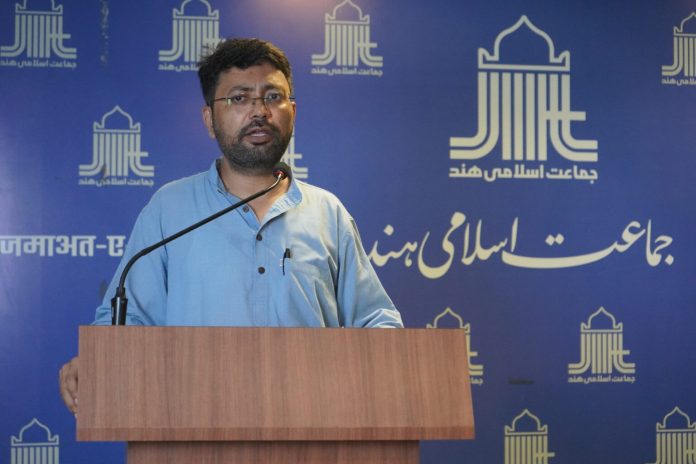In a powerful address delivered at the Jamaat-e-Islami Hind (JIH) headquarters, Nadeem Khan, Secretary of the Association for Protection of Civil Rights (APCR), condemned the ongoing Special Intensive Revision (SIR) of voter rolls in Bihar, describing it as a covert attempt to implement the National Register of Citizens (NRC) at a national level. He labelled the process unconstitutional and discriminatory, warning that it would disenfranchise millions, especially among the poor and marginalised communities.
Khan voiced alarm over the Election Commission of India’s (ECI) decision to initiate fresh electoral lists in Bihar ahead of the upcoming Assembly elections. He questioned the transparency and intent behind this exercise, stating that even political parties were confused and issuing contradictory statements. According to him, the government appears to be reversing the democratic process by attempting to pre-select its voters. He stated that the current exercise is not about routine corrections or updates, but about redefining who gets the right to vote.
Khan also raised serious allegations regarding the credibility of the ECI, citing alleged manipulation in at least 72 constituencies during the 2024 general elections. Referring to findings by civil society groups such as the Constitutional Conduct Group, he claimed that most of the tampering occurred during the counting phase and played a decisive role in forming the NDA government.
He pointed to suspicious growth in voter registrations in certain states, particularly Maharashtra and Haryana, where constituencies previously lost by the ruling party suddenly saw tens of thousands of new voter additions in a short period. In Maharashtra, voter rolls increased by 41 lakh in just five months between the Lok Sabha and Assembly elections, compared to a five-year growth of 31 lakh. According to Khan, this indicates an engineered rather than natural increase.
Khan further argued that the SIR process deviates from the Election Commission’s earlier inclusive approach. He noted that the Commission used to send staff door-to-door to register even the homeless. Now, ordinary citizens are burdened with proving their eligibility through complicated documentation. He warned that this shift mirrors the U.S. model of voter registration, which excludes a significant portion of the population. In contrast, India’s electoral system had achieved over 93% registration. The new system threatens to reduce this drastically, particularly impacting minorities, Dalits, OBCs, and the poor.
He criticised the heavy documentation requirements imposed under SIR. Even individuals already on the voter list are being asked to provide fresh proofs of birth and parentage. Khan cited data showing that only 2.8% of people in Bihar possess birth certificates and only 2.4% hold passports. With less than half of the population having completed matriculation, he questioned how rural women, farmers, and labourers are expected to produce documents the government itself knows they lack.
Describing Bihar as a testing ground for a wider national plan, Khan warned that this process resembles the NRC implemented in Assam. He noted that the Election Commission has already uploaded the 2002 voter list of West Bengal on its website, signalling that it could be the next target.
Khan dismissed the narrative that the SIR aims to remove illegal immigrants. He pointed out that a recent 789-page affidavit by the Election Commission submitted to the Supreme Court made no mention of Bangladeshis or Rohingyas. He called the illegal immigrant narrative a “smokescreen,” alleging the real goal is to strip legitimate citizens of their right to vote.
Comparing the SIR with the NRC in Assam, Khan stated that the SIR is even more dangerous. While the NRC had judicial or quasi-judicial mechanisms, under SIR, a single official such as an Assistant Returning Officer or District Election Officer can label someone as a “doubtful voter” without due process. This, he warned, is NRC without accountability or appeal.
He also raised concerns about the feasibility of completing such a large-scale exercise in just 25 days, arguing that it is logistically impossible and will inevitably lead to mass exclusions and errors.
Khan announced that APCR and allied organizations have filed legal challenges and are also mobilizing public resistance. He emphasized that this issue transcends Bihar and poses a threat to the entire nation’s democratic foundation. He warned that if allowed to proceed, the SIR will set a dangerous precedent for the country, shifting it away from an inclusive democratic model.
In his concluding remarks, Khan said that India was once admired for the inclusiveness of its electoral system. The current exercise, however, seeks to silence the voices of the very people democracy is supposed to empower — the poor, the minorities, and the marginalized. Calling the SIR a “backdoor NRC,” he declared it a direct attack on the soul of Indian democracy. He also announced that APCR, along with its partners, would soon release a comprehensive report documenting the flaws and dangers of the SIR in Bihar, pledging to continue the fight for justice, equality, and constitutional rights.




